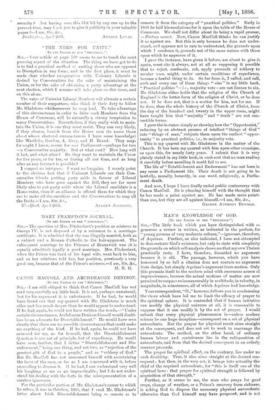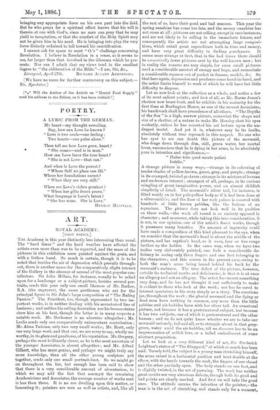MAN'S KNOWLEDGE OF GOD.
[To THE EDITOR OF THE "SPECTATOR."]
SIR,—The little book which you have distinguished with so generous a review is written, as indicated in the preface, for "young persons of very moderate culture,"—ignorant, therefore, of Aquinas. Further, as also indicated, I have not attempted to demonstrate God's existence, but only to state with simplicity the grounds on which self-analysis shows me that my own Theism practically rests. I have, therefore, discarded no argument because it is old. The passage, however, which you have honoured by so full a citation does not contain an argument from design, but simply Aquinas's argument from motion. Only this presents itself to the modern mind with enormous access of impressiveness, because the actual motions of matter are now perceived to surpass so immeasurably in multitude, in velocity, in magnitude, in minuteness, all of which Aquinas had knowledge. - Your correspondent, "O.," however, follows you in condemning the views which have led me to limit the efficacy of prayer to the spiritual sphere. It is contended that if human initiative can modify the physical universe at all, it is reasonable to suppose that it can modify it by the act of prayer. I would submit that every physical phenomenon is—unless modern. science be one huge deception—consequent on a set of physical antecedents. But the prayer for physical result aims straight at the consequent, and does not set to work to rearrange the antecedents. The method, on the other hand, of ordinary human labour and contrivance lies in the redisposition of antecedents, and from that the desired consequent in an orderly manner proceeds.
The prayer for spiritual effect, on the contrary, lies under no such disability. True, it also aims straight at the desired con- sequent ; but then, in the very act, it brings into actuality the chief of the required antecedents, for "this is itself one of the spiritual laws : that prayer for spiritual strength is followed by acquisition of that strength."
Further, as it seems to me, the man who prays for good crops, change of weather, or a Prince's recovery from sickness, is asking God to dispose the necessary physical antecedents otherwise than God himself may have purposed, and is not
bringing any appropriate force on his own part into the field. But he who prays for a spiritual effect knows that his will is therein at one with God's, since no man can pray that he may yield to temptation, or that the comfort of the Holy Spirit may not be given him in his need. He is bringing into play the very force divinely ordained to tell toward his sanctification.
I cannot ask for space to meet " 0.'s " challenge concerning Revelation. I believe in Revelation in a sense, as it seems to me, far larger than that involved in the dilemma which he pre- sents. Nor can I admit that my views tend in the smallest degree to " the obliteration of the Bible."—I am, Sir, &c., [We have no room for further controversy on this subject.— ED. Spectator.]





































 Previous page
Previous page